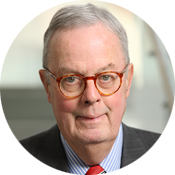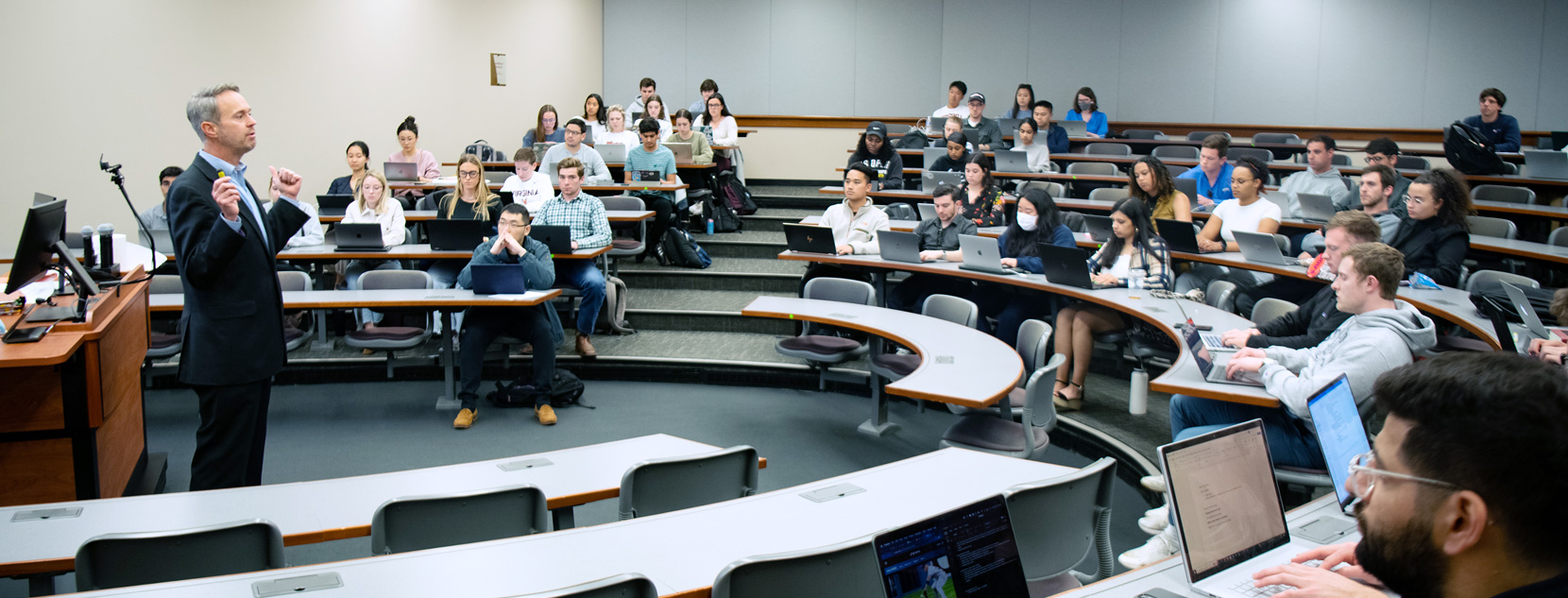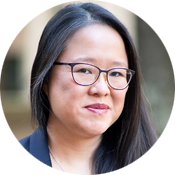It’s the second week of the second semester at UVA Law and Carrie Stanton ’11, a young corporate partner in Williams Mullen’s Charlottesville office, has dedicated her Wednesday evening to teaching 50 chattering first-years a scaled-down version of everything she knows about startups and initial entity formation.
She’ll come back every Wednesday for the rest of the semester — next week’s topics include governance and fiduciary duties — to take students through the life cycle of a company in her Introduction to Law & Business class, a cornerstone of the school’s John W. Glynn Jr. Law & Business Program, which celebrates its 20th anniversary this year.
“I remember how it felt to be a 1L … not sure whether I had a handle on anything,” she whispered just before the class started. “So I’m hoping to provide some practical experience that’ll give them confidence in their summers and then confidence going into the higher-level Law & Business courses that follow.”

JOHN GLYNN ’65 HAS BEEN a California venture capitalist for 52 years, with investments in leading tech companies that include Facebook, LinkedIn, DocuSign, Intel and Intuit. Yet he still remembers the uncertain feelings Stanton described, as he started his career at the second-largest San Francisco law firm, fresh out of law school.
“I was working for a mergers and acquisitions partner, and I had no idea what any of the terminology they were throwing around — 'pooling,’ ‘accounting’ and what have you — meant,” Glynn said. “So I figured, ‘Gee, if I want to be any good as a corporate lawyer, I’d better learn something about accounting and finance and a little bit of business so I can hold my own with them.’”
Within four years, Glynn had left the practice of law to pursue his MBA at the Stanford Graduate School of Business, a move he might not have needed to make if law students at the time had been more exposed to the language and ways of the business world.
By 2003, Glynn was a leading member of a UVA Law alumni group called the Business Advisory Council, which was formed in 1995 to take advantage of the strength of alumni in business, finance and corporate practice. He was also a member of the UVA Law School Foundation Board of Trustees and chaired its investment committee.
With input from Glynn and the council, and under the leadership of then-Dean John Jeffries ’73 and Professor Paul G. Mahoney (who was then associate dean for academic affairs), the school introduced the Law & Business Program. The program added classes focused on quantitative methods, finance, accounting, corporate governance and an understanding of capital markets, according to Foundation President and CEO Luis Alvarez Jr. ’88.
Mahoney was charged with developing the content and sequence of the new Law & Business Program. Glynn “liked and encouraged it” and — after a decade of proof of concept in the classroom — he endowed the program, giving it the means to function in perpetuity, Alvarez said.
Glynn said he believes business knowledge is more in demand than ever. “What you find now is a tremendous interest in the entrepreneurial area, even in law school, and the Law & Business Program is one key to that world,” he said.
TWENTY YEARS IN, the program offers a full ring of keys to students hoping to enter the world of business, whether as a corporate lawyer, in-house counsel, entrepreneur, executive or financier.
Students interested in taking specialized versions of the school’s business law classes are encouraged to first take the Accounting and Corporate Finance classes. (Certain undergraduate business courses provide the necessary background, as well.)
From there, specialized versions of corporations, securities regulation, bankruptcy law and more are available, along with dozens of short courses typically taught by alumni who are luminaries in the business or corporate law field.
George S. Geis, who has served as a director of the program twice while regularly teaching courses in the program, said there are multiple advantages to these core courses.
“Because [the students] already have that business skills training, the professors who teach the Law & Business sections know they can use their time a little bit differently than in a regular section of the class,” Geis said.
 In 2020, Glynn named and endowed the Glynn Family Bicentennial Professorship held by Professor George Geis, who at the time was serving as director of the Law & Business Program.
In 2020, Glynn named and endowed the Glynn Family Bicentennial Professorship held by Professor George Geis, who at the time was serving as director of the Law & Business Program.
THE SHORT COURSES, which occur throughout the year, give students an opportunity to look at, say, an actual ripped-from-the-headlines acquisition deal, with a more practical eye, according to Thomas R. Denison ’86, a private equity veteran who has been teaching Law & Business short courses as an adjunct for more than a dozen years.
“It doesn’t take much to have more experience than the average first-year associate,” Denison said. “How easy is it to put together the second IKEA shelf once you’ve figured out the first? If I can allow people to show up [at their firms] having gone through a transaction and looked at all the different phases of it, they will be so much more prepared.”
Short courses this spring have included Corporate Litigation in the Delaware Court of Chancery, taught by one of the court’s vice chancellors, Morgan Zurn (Col ’03), and Energy and Environmental Products Trading and Commodities Regulation, taught by commodities lawyer and vineyard owner Athena Velie Eastwood ’02.
Glynn expressed admiration and gratitude for the adjuncts who teach the courses, calling their contributions a “gift.”
“We have some of our brightest, most successful alumni coming down and giving us a week or two or more of their time to teach these courses,” Glynn said. “You don’t get this from every law school.”
For the short course instructors, their time is quite literally a gift-in-kind. Although they are paid a stipend for the time they spend in Charlottesville, it essentially covers their lodging costs and many donate it to the Foundation, Alvarez said.
Jim Donovan, the vice chairman of Goldman Sachs who has taught corporate strategy, leadership and team management at the Law School for 15 years, has put all of his salary, in addition to his own gifts, into a scholarship fund for students in financial need. His goal is to create a $1 million scholarship endowment, Alvarez said.
Although Donovan has no formal ties to UVA Law, his daughter and son are undergraduate Hoos.
“I feel so fortunate to be part of the UVA community, and it makes me very happy to think I might play a small role in others having that same opportunity,” he said.
With a significant chunk of UVA Law graduates headed into corporate-focused law firms, Glynn’s and the adjuncts’ gifts through the Law & Business Program have produced thousands of law graduates more prepared for the early years of practice.
Since the program began, the school’s curricular and extracurricular options have flourished: a student-run business journal, a clinic advising startups and nonprofits, and an investment club. Last year, those organizations along with the Law & Business Program co-sponsored the first Transactional Law Competition for second- and third-year law students — a moot court-type competition for aspiring M&A lawyers at UVA.
That contest, won by Class of 2022 graduates Max Ain and Andrew Teal, tested students’ negotiating skills.
“Max and I were fortunate to have taken UVA Law courses that touch on skills helpful for the competition, including the Transactional Approach to M&A course, and a drafting and negotiation course,” Teal said.
The broad business offerings have helped more students feel ready on day one of their careers.
Stanton, who took a healthy dose of Law & Business classes during her time on North Grounds, still recalls her first client matter as an associate.
“They had an issue with a capitalization table, showing the ownership of the company,” she said. “Cap tables can get pretty complicated, but I was able to run with it in a way that some young lawyers who hadn’t had the business curriculum could not.”
THE PROGRAM’S CURRENT DIRECTOR is looking ahead to the next 20 years at the school. Professor Cathy Hwang, a former Skadden Arps mergers and acquisitions attorney who is now the Barron F. Black Research Professor of Law, has some ideas for expanding the program even further.

Hwang hopes to broaden a pipeline of clerks to the premier business courts in the country, the Delaware Court of Chancery and the Delaware Supreme Court, through mentoring relationships with judges and former clerks and perhaps by organizing an annual field trip to Delaware to watch a trial at the Chancery Court.
She’s also looking to sponsor roundtable events that feature diverse scholars, to elevate their public profile and inspire students to pursue this field.
“My goals are to increase diversity, inclusion and access to business law, scholarship and practice,” Hwang said. “There are relatively few women and women of color in business legal practice and business law academia, and I think we can change that.”
As of this year, the program has two student fellows who work as rotating research assistants to support affiliated faculty, assisting them on projects such as data collection, casebook editing and other research projects.
Dean Risa Goluboff expressed pride that the Law School has been among the “early movers and innovators” in bringing business expertise into the curriculum.
“We couldn’t have done this with as much focus and intention were it not for the generosity of John Glynn and the leadership and foresight of the program’s directors over the years,” Goluboff said. “I look forward to seeing how the program will continue to expand and innovate in the future.”
As the Law & Business Program has evolved, Glynn has observed its growth and progress with satisfaction.
“This experience gives students a much, much, much better chance of broadening their horizons and being more effective at whatever they choose to do,” he said. “I’m proud of the fact that this thing didn’t fade away — it’s still with us.”
Founded in 1819, the University of Virginia School of Law is the second-oldest continuously operating law school in the nation. Consistently ranked among the top law schools, Virginia is a world-renowned training ground for distinguished lawyers and public servants, instilling in them a commitment to leadership, integrity and community service.


